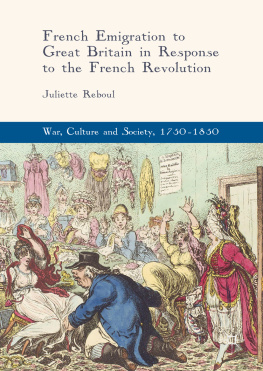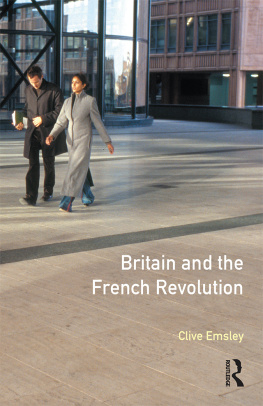1. migrs, Refugees and Emigrants
Refugee , migr , migr, and emigrant, exile, counter-revolutionary, fugitifs and aristocrates : the vocabulary chosen to label French migrants in revolutionary times unquestionably reflects the describers political position on emigration. A teleological figure, the migr/refugee still unconsciously serves the purposes of national histories . In the modern English-speaking academic world, the migrants who left France during the Revolution are often designated as refugees .
Adopting a terminology rid of prejudices gives way to new approaches, combining both historiographical traditions. It is also an umbrella term used by Simon Burrows in his French Exiled Journalism to cover the nexus of lay emigrants, clerical exiles, and francophone individuals in London, engaged against the revolutionary and imperial governments. Emigrant and displaced seem devoid of prejudices on the migrants and hosts political projects, consigning emigration to the geographical displacement of the French population. Refugee, migr, and counter-revolutionary, all refer to three different intentions related to emigration. Refugee (and even sometimes immigrant ) can be used when the perspective of the host society is discussed, and migr when the perspective derives from the dialectic between revolution/anti-revolution. Counter-revolutionary is used when referring to the military and ideological dimensions of emigration; it is also an appropriate adjective to describe a heterogeneous nexus of opponents to different phases of the Revolution. With these technical and linguistic grounds set, this chapter endeavours to describe, as concisely as possible, the evolution of the historiography on emigration in Great Britain. Starting with up-to-date empirical knowledge, it then follows a slippery road, summarising and questioning 200 years of revolutionary, anti-revolutionary, counter-revolutionary, and academic discourses on a controversial population displacement. Collective memories of the French presence in Great Britain during the Revolution have drastically evolved in the two centuries since the last emigrants returned to France. Coupled with European interests for transnational academic subjects and collaborations, the passage from partisan memories on emigration to the academic and rigorous discourse on this subject in the past fifteen to twenty years allows for a profound modification in the choice of sources and methodologies used to analyse this phenomenon.
Overview
Most historians agree that emigration started in the aftermath of the fall of the Bastille , when the Comte d Artois brother to Louis XVIand the family de Cond left France. By December 1792, that number had risen to almost 7400. In 1800, 5621 clerics were settled in the British Isles. However, by 1815, the population had dropped to just 350 individuals. Yet, the overall incidence of emigration in Britain is not quantifiable. The number itself strongly depends on individual identification as an emigrant, on the proximity to a particular political group, on ones connection with the migr establishment, as well as on the host countrys recognition of the individuals status and identity as a political migrant.
Recent historiographical efforts highlight the political and sociological heterogeneity of the displaced group. When many cautious aristocrats left France alarmed by the Grande Peur of July and August 1789 and for a few years after, Great Britain was still considered a tourist destination. In 1789 to early 1792, the French noble bathing in Bath or Tunbridge Wells might not so much have fled as travelled expecting a quick return to a political status quo in France. On 13 September 1791, as he reluctantly signed the Constitution, an amnesty of two months was given to the emigrants. Ultimately, the King condoning the Constitution reinforced the gap between the French monarch and warring counter-revolutionary nobilities. The emigration process intensified. Countless officers and ideologues exited France and gathered along the eastern Rhineland in the Armes des Princes and de Cond . War broke out in continental Europe in April 1792. London took a neutral stance. It rejoiced in seeing its principal military and economic challenger weakened.
It was not until September 1792 that Great Britain began to attract emigrants escaping war and the Massacres de Septembre that inaugurated the new Republic. Many amongst the Normand and Breton civilian population exiled themselves in the Channel Islands and in its mainland, as several border dwellers searched for a haven across the French frontiers. These regional outliers excluded, the First and Second estates represent approximately 63% of the emigrant population, a low estimate of the division in estate of the French population in the British Isles between 1789 and 1815. However, these numbers hide a rich diversity including wealth, connection to the host country, mentality, and political association.
Following the declaration of war of April 1792, those who left France were essentially perceived as enemies of the French nation . The definition of nation had endured continuous restrictions since 23 October 1792, when Republican legislators attempted to define rules to access French nationality. As Britain remained the only European territory not conquered by the Imperial armies, it was perceived until 1815 as a haven of choice.
The latest research on the political and social diversity in emigration in Great Britain creates a stark contrast with the leitmotivs on the phenomenon. This raises questions about myths construction and its influence on historiography. To paraphrase Eric Hobsbawm, part of the History of [emigration] is what the nineteenth century made of it.
From Nation-Centric Perspectives on Emigration to Comparative Studies
The construction of French and British memories on emigration started with the Revolution. In France, anti-emigration policies worked in tandem with the reunion of archives in national and departmental centres. The French emigrant became, by antithesis, a refugee, eighteenth-century second-rate counterpart to the Protestant Huguenot saved by British altruism . Coherent and cohesive in each national imagination, these sources made all foreign sources on emigration obsolete.
Following the Revolution and the fall of the Empire, conservative memories have dominated the early nineteenth century. For Jean-Clment Martin, the Counter-Revolution had an impact equivalent to that of revolutionary movements in defining nineteenth-century European cultures, politics, and societies. He controversially argued that the migr presence had allowed for the renewal of Catholicism in England. This narrative transformed the relations between the migrs and their British hosts, reinterpreting every event through the lens of nineteenth century Legitimism.
Before the Revolution of 1830, the French liberal and anglophile opposition to the regime asserted that emigration had been politically segregated, insisting on successful relations between constitutional migrs and their British hosts. This memory stated that constitutional monarchists and moderate revolutionaries had been exiled by a radicalised French State despite their efforts to build a modern and reformed system of governance. Using self-narratives from military officers and administrators, constitutionalist historians fabricated the notion that legitimists fled to Germanic countries , and liberals, migrs of freedom, found a haven in the British Isles . In 1825, Franois Mongin de Montrol explained that the adoption of the Milliard would be a calamity; the legitimist emigration was indeed responsible for thirty years of war outside and the anarchy and Terror inside. Hence, up to the mid-century, memories and histories on Great Britain were plagued by partisan discourse. Whether Britain was thought of as friend or foe, propagandist description of the British reception of emigrants only served contemporary agendas.













